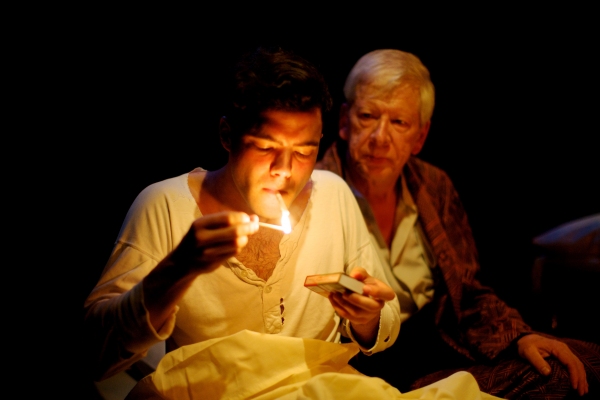Vieux Carré at the King’s Head Theatre

The stifling heat in the auditorium only added to the Cajun atmosphere. 722 Toulouse Street, a dank and decrepit New Orleans boarding house, serves as the almost-living backdrop to Tennessee Williams’s autobiographical play Vieux Carré. Though a play long in genesis – written over a period of forty years – its premier run proved to be its last, enjoying only five performances on Broadway before closing in 1977. Subsequently neglected in favour of Williams’s better known works, the play’s revival at Islington’s King’s Head Theatre is an intriguing choice, and yet one that is emphatically vindicated.
Williams’s youth is captured superbly by Tom Ross-Williams, who imbues his character, The Writer, with a persona that is very much ill at ease with the world, despite possessing a burning desire to find his self, amid the backdrop of a virtual charnel house, replete with bizarre individuals. The rich emotional core of the play is generated by a brilliantly nuanced trinity of supporting characters and The Writer has both a spectral yet emotionally supportive relationship with them. The furtive, conniving landlady, Mrs Wire (Nancy Crane), swings dangerously between breakdown and gallant matriarch, emerging from her domain beneath the piano to both chastise and fend off her problematic tenants. The Writer shares his room with the aged painter Nightingale (David Whitworth), a self-labelled “rapacious” homosexual, ailing with consumption. Nightingale seeks to draw the young écrivain out of his shell, eliciting a mutual knowing of the difficult realities of homosexuality in a judgemental world. Completing the trinity of emotional tumult is Jane (Samantha Coughlan), a contemporary fallen woman from New York City, who is deeper than her fellow residents. Eking out a tawdry existence with her feckless lover, Tye (Paul Standell) – a drug-addict bouncer, whose nocturnal lifestyle fails to satisfy her thirst for sophisticated companionship – she forms a level of understanding with The Writer, attainting solitude in their philosophical synergy. The residents of the boarding house are completed by Mary Maude (Anna Kirke) and Miss Carrie (Hildegard Neil), a pair of destitute, emaciated spinsters, foraging for both literal and mental sustenance. Finally, the stoic touchstone of the play is Nursie (Eva Fontaine), a put-upon black housemaid who, other than The Writer, seems to be the only sane inmate of the asylum.
Under Robert Chevara’s intuitive directing, the first act of Williams’s forgotten play beautifully constructs the lives of the residents and the dynamic between them. Biting dark humour, moments of poignancy and heartbreaking developments are evoked from mere commonplace events befitting a 1930s charnel house of lost souls. With The Writer trapped in such a place and struggling to find his way, the resultant atmosphere of strangely hopeful gloom is superb. Not afraid to depict a lewd act by Nightingale or Jane’s borderline rape at the hands of Tye, the play manages to stay rooted to firm realities and the variances of human nature, echoing Williams’s own adolescence.
Taking place four months after the first, the second act introduces a polar-shift in the occupants of the boarding house. The Writer, now much more assertive and content, faces a trinity who are much diminished: Mrs Wire, on the verge of breakdown; Nightingale, his joie de vivre absent at the end of his mortal coil and Jane, finally caught by a relapse of leukaemia, which the blunt Tye cannot comprehend. Reunited with his previously hawked typewriter, The Writer resolutely documents the plight of the boarding house residents, declaring that “writers are shameless spies”.
The success of Vieux Carré rests mainly on Williams’s characterful script and the concordant acting of the ensemble cast. Ross-Williams gives a powerful performance as both a spectral narrator and troubled young vagrant, who manages to foster a heartbreaking friendship with Jane. Furthermore, the interactions between Mrs Wire and Nightingale added a deliciously fruity element to the performance, and Crane and Whitworth must take full credit for it. Indeed, the latter’s portrayal of the consumption-ridden Nightingale spending, perhaps, his last night on earth is unlikely to be bettered for some time.
Some aspects of the production did seem to jar somewhat, not least the numinous interlude of Nightingale being spirited away to meet his maker, as well as a memorable yet unseen photo shoot orgy in the cellar. Moreover, whilst the accents of The Writer, Nursie and Tye were evocative of a depression-era New Orleans, the rest of the cast failed to make a similarly convincing oratorical leap.
Vieux Carré is a tremendously atmospheric, darkly funny and strangely life-affirming play that evokes the search for emotional sustenance, which except for The Writer, is all too late for the residents of 722 Toulouse Street. Be sure to check in.
Jonathan David Brunton
Vieux Carré is at the King’s Head Theatre, Islington, until 10th August.























Facebook
Twitter
Instagram
YouTube
RSS